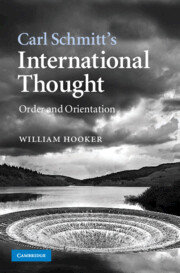Book contents
- Frontmatter
- Contents
- Preface
- Chronology of Schmitt's life
- 1 Introduction
- 2 Schmitt's ‘international thought’
- 3 Unravelling sovereignty
- 4 Histories of space
- 5 Acceleration and restraint
- 6 Großraum
- 7 Partisan
- 8 Conclusion
- Appendix. Carl Schmitt in international relations: a bibliographic essay
- Bibliography
- Index
5 - Acceleration and restraint
Published online by Cambridge University Press: 29 March 2010
- Frontmatter
- Contents
- Preface
- Chronology of Schmitt's life
- 1 Introduction
- 2 Schmitt's ‘international thought’
- 3 Unravelling sovereignty
- 4 Histories of space
- 5 Acceleration and restraint
- 6 Großraum
- 7 Partisan
- 8 Conclusion
- Appendix. Carl Schmitt in international relations: a bibliographic essay
- Bibliography
- Index
Summary
I have a methodology that is peculiar to me: the phenomena that occur to me, so to speak, from things [Stoff] that I think about, and not from pre-existing criteria. One can call that phenomenological, but I myself prefer to avoid such general methodological questions. They tend to go on for ever.
These intertwined stories of the dissolution of the state and the order of states are of inestimable importance in understanding Schmitt's personal intellectual and emotive response to the political world around him. They skewed his reading of contemporary phenomena, heightened his sense of the importance of the current age, and provoked in him a curiously energetic pessimism in contemplating the future. Unlike other epochal changes, Schmitt sees the twentieth century as dominated by the preordained collapse of the existing order, but without the evident advent of a new age. Any attempt to read Schmitt as a theorist of the present must, it would seem, weigh the effects of this intense spirit of fin de siècle.
Moreover, it would appear that any productive attempt to ‘think with’ Schmitt about normative order and the future of the political must share this fear of the end. The whole insistence on the logical priority and necessity of enmity feeds off such apprehension. Naturally, there may be many foundations for such a fear, and the basis of Schmitt's own concerns are hotly contested.
- Type
- Chapter
- Information
- Carl Schmitt's International ThoughtOrder and Orientation, pp. 102 - 125Publisher: Cambridge University PressPrint publication year: 2009



